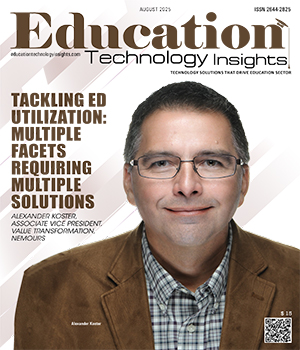THANK YOU FOR SUBSCRIBING
Be first to read the latest tech news, Industry Leader's Insights, and CIO interviews of medium and large enterprises exclusively from Education Technology Insights
Purposeful Leadership Through Professional Development
Toni M. Shelton, Manager, Office of Professional Development, Facility Management Department, Denver Public Schools
 Toni M. Shelton, Manager, Office of Professional Development, Facility Management Department, Denver Public Schools
Toni M. Shelton, Manager, Office of Professional Development, Facility Management Department, Denver Public SchoolsToni M. Shelton is deeply committed to developing leaders who lead with purpose. She specializes in creating strategic professional development programs that align individual growth with organizational vision. Her leadership philosophy centers on the belief that effective leaders prepare others to be leaders, fostering environments where creativity, innovation, and personal development thrive.
Why Purposeful Leadership Matters
Leadership is not my problem; it's my privilege. You don't do it because you are good at it; you do it because you care. Then you get good at it! The practice of effective leadership is to prepare others to be leaders. Leadership is a choice, a role of authority that impacts the lives of others. How much are you willing to give to someone else what they need in order for them to be successful?
If You Are Not Creating Leaders, You Are Not Leading!
The modern workplace is undergoing unprecedented transformation. Artificial intelligence is reshaping operations, hybrid work is redefining culture and global competition is accelerating innovation cycles. Leaders who do not demonstrate purposeful thinking risk guiding their teams with outdated models that fail to align with emerging realities.
As a purposeful leader, operating in your gift allows you to better recognize that the way you interact with others should be on purpose! Your actions are on purpose; your words are on purpose; your leadership is on purpose. Does this sound like outside-of-the-box thinking—absolutely! When leading out of purpose, it creates an inspirational environment that leads to creativity, innovation and personal development.
Leading on purpose opens a unique type of dialogue when communicating with others. You begin to hear and translate emotion through commonly used sentiments. The sentiments revealed allow the leader to probe for deeper discussion and understanding. To elevate the dialogue into a sense of purpose.
Keeping The Conversation Purposeful
Purposeful Leaders lead others to discover their own:
Purpose—"Why I do what I do"
Identity—"Who I am and what I bring"
Language —"How I express and shape meaning with others"
Since it's very rare that an individual does not want to talk about themselves, leading them to purpose is a great opportunity. During dialogue, it's important to understand and comprehend the message in order to distinguish which attribute someone wants to grow.
Purposeful Leadership places emphasis on clarity of purpose; it helps others see how their contributions matter in a broader context. By recognizing talents and encouraging inclusion, they create an environment where others feel safe to bring their authentic selves. They use language that invites growth, ownership and inclusion—no blame, shame or judgment.
By embedding professional development into leadership strategies, organizations gain and transform workplaces into a skilled collective community of foresight, growth and empowerment with the ability to see around corners and prepare for what's next.
Leveraging Professional Development as a Strategic Tool
This requires the ability to create actionable behaviors that maintain stature and reputation, which gains respect. The leader also has the responsibility for driving results. The more the leader can add to the beliefs of others, the more they increase the confidence of others, which elevates their performance. Others will begin to demonstrate their ability in three key areas.
Setting The Bar—Determine what the desired result looks like. Help individuals envision themselves making successful decisions and exhibiting behaviors that support their success.
Alternate Perspectives —As the leader, you need to be able to help others to explore different perspectives, so that others can acquire for themselves the viewpoints they consider most powerful.
Modeling— Consistently demonstrate the skill sets that align with performance expectations. Challenge processes, create best practices and encourage forward thinking. Consider: What are you willing to give up, in order to achieve the desired results? Encourage others to assist in their own growth.
Professional development is the mechanism that ensures leaders and teams are not rigidly bound to one path. Instead, they are equipped to interpret signals, innovate solutions and adapt proactively. When leadership development is designed through the lens of foresight and purpose, it creates an organization that:
Anticipates and embraces changes instead of resisting them.
Balances short-term performance with long-term positioning.
Encourages innovation not as an occasional initiative, but as a best practice capability.
Performances increase in the midst of challenging and engaging tasks. By embracing professional development as an ongoing, integrated and strategic investment, organizations will start to cultivate purposeful leadership as a best practice for continuous improvement.
Read Also
Advancing Organizational Learning and Leadership in Community Colleges
Purposeful Leadership Through Professional Development
Pedagogical Implications of Chatting with AI to Learn
Advancing Higher Education through Data-Driven Innovation and Generative AI
Cultivating a Trust-Driven Technology Culture in K-12 Education
Reimagining Adult Education

I agree We use cookies on this website to enhance your user experience. By clicking any link on this page you are giving your consent for us to set cookies. More info

However, if you would like to share the information in this article, you may use the link below:
www.educationtechnologyinsightseurope.com/cxoinsights/toni-m-shelton-nid-3502.html






















